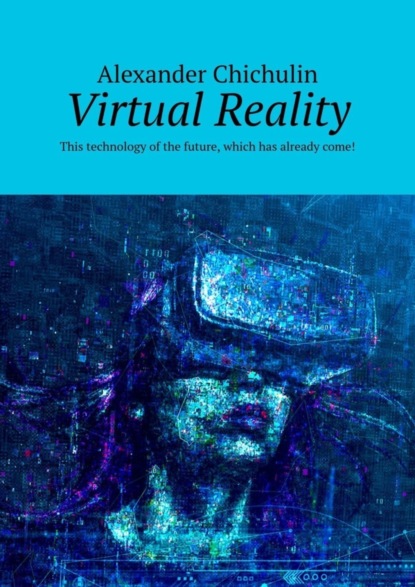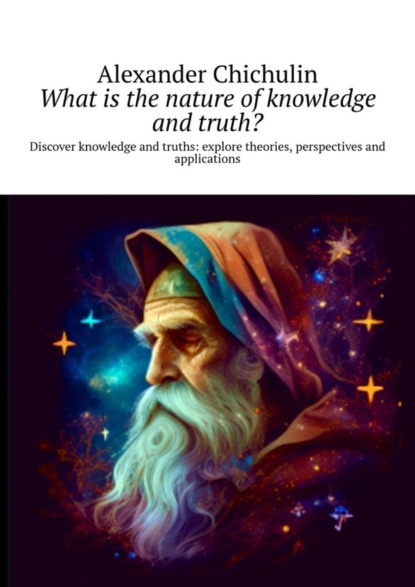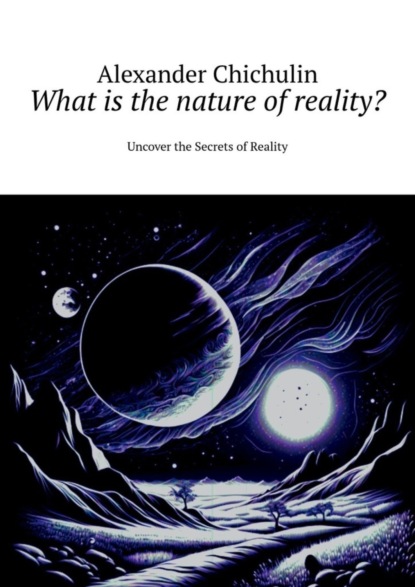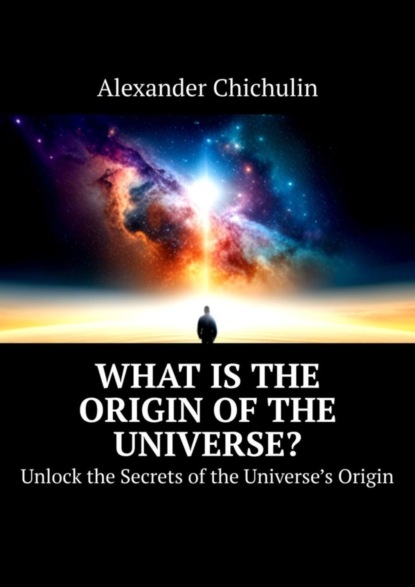
Полная версия:
Alexander Chichulin What is the meaning of life? From ancient wisdom to modern insights: The meaning of life
- + Увеличить шрифт
- - Уменьшить шрифт
What is the meaning of life?
From ancient wisdom to modern insights: The meaning of life
Alexander Chichulin
© Alexander Chichulin, 2023
ISBN 978-5-0059-9839-2
Created with Ridero smart publishing system
1. Introduction
– What is the question of the meaning of life?
The question of the meaning of life is a philosophical and existential inquiry into the purpose, significance, and value of human existence. It is a question that has been asked throughout history by individuals, communities, and cultures seeking to understand the nature of reality and the human condition. The question of the meaning of life is a fundamental one that has no easy answer, as it touches on issues of identity, morality, purpose, and happiness. The search for meaning can take many forms and may lead individuals to explore different philosophical, religious, or cultural traditions, or to develop their own unique perspective on the meaning of life.
– Why is this question important?
The question of the meaning of life is important because it is a fundamental human concern that can shape our values, beliefs, and actions. It is a question that has puzzled philosophers, scientists, theologians, and ordinary people for centuries, and it continues to be a source of debate and inquiry. The search for meaning can provide individuals with a sense of purpose, direction, and fulfillment in life, and can also help them to make sense of their experiences and navigate the challenges and uncertainties of existence. At the same time, the question of the meaning of life is important for society as a whole, as it can shape our collective values, beliefs, and institutions, and inform the way we approach issues such as ethics, politics, and the environment. The question of the meaning of life is therefore a profound and essential one that can inspire reflection, dialogue, and discovery, and can help us to live more meaningful and fulfilling lives.
2. Historical Perspectives on the Meaning of Life
Historical perspectives on the meaning of life refer to the various ways in which different cultures and societies have approached this fundamental question throughout history. Here are some examples:
– Ancient Greek philosophy: Philosophers such as Plato and Aristotle saw the search for meaning as an essential aspect of human life, and believed that happiness and fulfillment could be found through the cultivation of virtues such as wisdom, courage, and justice.
– Judeo-Christian theology: The Abrahamic religions, including Judaism, Christianity, and Islam, view human life as having a divine purpose and meaning. The purpose of human existence is to serve God and follow his commandments, and the afterlife is seen as a continuation of this purpose.
– Eastern spirituality: Eastern traditions such as Buddhism and Hinduism see the search for meaning as a central aspect of spiritual practice, with the goal being to attain enlightenment or liberation from the cycle of birth and death.
– Renaissance humanism: The humanist movement of the Renaissance emphasized the importance of human dignity, freedom, and individualism, and saw the search for meaning as an expression of human creativity and potential.
– Existentialism: In the 20th century, philosophers such as Jean-Paul Sartre and Albert Camus explored the idea that human existence is inherently meaningless, and that individuals must create their own meaning in life through authentic choices and actions.
These are just a few examples of the diverse historical perspectives on the meaning of life, which reflect the different cultural, religious, and philosophical contexts in which they emerged.
– Ancient views on the meaning of life
Ancient views on the meaning of life were shaped by the philosophical and religious traditions of the time, and varied across different cultures and societies. Here are some examples of ancient views on the meaning of life:
– Greek philosophy: Ancient Greek philosophers such as Plato and Aristotle saw the search for meaning as an essential aspect of human life. Plato believed that happiness and fulfillment could be found through the cultivation of wisdom, courage, and justice, while Aristotle believed that the goal of life was to achieve Eudaimonia, or “human flourishing.”
– Stoicism: The Stoic philosophers, including Seneca, Epictetus, and Marcus Aurelius, saw the search for meaning as a matter of cultivating inner strength and resilience in the face of adversity. The goal was to live in accordance with nature and the rational order of the universe, and to find happiness and fulfillment through virtue and self-control.
– Hinduism: In Hinduism, the search for meaning is tied to the idea of dharma, or cosmic order. The purpose of human life is to fulfill one’s dharma, or duty, which is determined by one’s caste, stage of life, and personal disposition. The ultimate goal is to attain moksha, or liberation from the cycle of birth and death.
– Confucianism: Confucianism, a philosophical and ethical system that originated in ancient China, emphasizes the importance of social harmony and moral conduct. The goal of life is to cultivate virtue, pursue knowledge, and fulfill one’s social roles and responsibilities.
These are just a few examples of the diverse ancient views on the meaning of life, which reflect the different cultural and philosophical contexts in which they emerged.
– Philosophical perspectives on the meaning of life
Philosophical perspectives on the meaning of life are diverse and complex, reflecting the various ways in which philosophers have approached this fundamental question. Here are some examples of philosophical perspectives on the meaning of life:
– Existentialism: Existentialist philosophers such as Jean-Paul Sartre and Albert Camus emphasized the subjective nature of meaning, arguing that individuals must create their own meaning in life through authentic choices and actions. They believed that the human condition is one of freedom, responsibility, and anxiety, and that the search for meaning requires an acceptance of the inherent absurdity and uncertainty of existence.
– Utilitarianism: Utilitarian philosophers such as Jeremy Bentham and John Stuart Mill see the search for meaning as tied to the pursuit of happiness and well-being. They argue that the goal of life is to maximize the overall happiness or pleasure of the greatest number of individuals, through actions that promote the greatest good for the greatest number.
– Aristotelianism: Aristotle’s philosophy sees the search for meaning as linked to the pursuit of Eudaimonia, or “human flourishing.” He believed that the key to a meaningful life is to cultivate virtues such as wisdom, courage, and justice, and to live in accordance with one’s natural inclinations and potential.
– Kantianism: Immanuel Kant’s philosophy sees the search for meaning as tied to the pursuit of moral duty and autonomy. He argued that the goal of life is to act in accordance with universal moral principles, such as the categorical imperative, and to strive for personal freedom and self-governance.
These are just a few examples of the diverse philosophical perspectives on the meaning of life, which reflect the different theoretical frameworks, ethical principles, and epistemological assumptions of different philosophers.
– Religious perspectives on the meaning of life
Religious perspectives on the meaning of life are diverse and varied, reflecting the different theological and cultural contexts in which they emerged. Here are some examples of religious perspectives on the meaning of life:
– Christianity: In Christianity, the search for meaning is tied to the belief in a loving and just God who created human beings in his image and for his glory. The purpose of human life is to love and serve God, follow his commandments, and share the good news of salvation with others. The ultimate goal is to attain eternal life in heaven through faith in Jesus Christ.
– Islam: In Islam, the search for meaning is tied to the belief in one God, who created human beings to worship and serve him. The purpose of human life is to submit to God’s will, follow his commandments, and seek spiritual purification through prayer, fasting, and other religious practices. The ultimate goal is to attain Paradise in the afterlife.
– Buddhism: In Buddhism, the search for meaning is tied to the belief in the Four Noble Truths and the Eightfold Path, which offer a path to liberation from suffering and the attainment of enlightenment. The purpose of human life is to overcome ignorance, desire, and attachment, and to cultivate compassion, wisdom, and mindfulness.
– Hinduism: In Hinduism, the search for meaning is tied to the belief in karma, reincarnation, and the ultimate goal of moksha or liberation from the cycle of birth and death. The purpose of human life is to fulfill one’s dharma, or duty, which is determined by one’s caste, stage of life, and personal disposition, and to seek spiritual purification through yoga, meditation, and devotion.
These are just a few examples of the diverse religious perspectives on the meaning of life, which reflect the different theological, ethical, and spiritual traditions of different faiths.
3. Contemporary Views on the Meaning of Life
Contemporary views on the meaning of life reflect the diverse cultural, social, and intellectual currents of the modern world. Here are some examples of contemporary views on the meaning of life:
– Scientific naturalism: Scientific naturalists see the search for meaning as tied to the pursuit of knowledge and understanding of the natural world. They argue that the universe is governed by natural laws and processes, and that human beings are products of evolution and biology. The purpose of human life is to discover and explore the mysteries of the universe, and to promote human flourishing through rational inquiry and technological innovation.
– Humanism: Humanists see the search for meaning as tied to the belief in human dignity, reason, and autonomy. They argue that human beings have the capacity to create meaning and purpose in life through their own efforts, without resorting to supernatural or religious beliefs. The purpose of human life is to fulfill one’s potential, seek happiness and fulfillment, and contribute to the well-being of others and the world.
Конец ознакомительного фрагмента.
Текст предоставлен ООО «ЛитРес».
Прочитайте эту книгу целиком, купив полную легальную версию на ЛитРес.
Безопасно оплатить книгу можно банковской картой Visa, MasterCard, Maestro, со счета мобильного телефона, с платежного терминала, в салоне МТС или Связной, через PayPal, WebMoney, Яндекс.Деньги, QIWI Кошелек, бонусными картами или другим удобным Вам способом.








